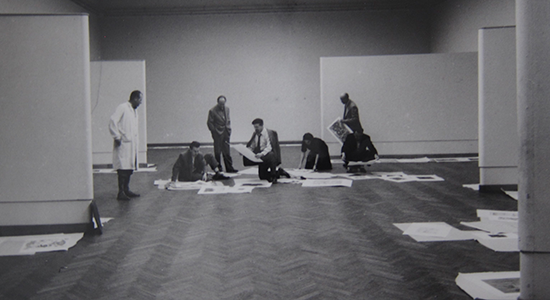
A Curatorial History from the Cold War
Lecture by Anthony Gardner (Head of School at The Ruskin School of Art, University of Oxford).
Gardner’s talk will explore the exhibition and curatorial history of Zoran Kržišnik, the long-term Director of Ljubljana’s main modern art museum, the Moderna galerija, and founder of the city’s renowned (and still on-going) biennale. His exhibitions and exhibition program anticipate some of the foundational developments in postwar art and curatorial histories; they also reveal complicated and sometimes contradictory politics underpinning the emergence of new internationalist exhibitions during the period, especially those in so-called nonaligned contexts. How we might articulate the legacies of these histories – the new directions they offer for the nascent disciplines of exhibition and curatorial histories, as well as the persistent problems they present – will become a core part of the story recounted here.
Contact: handberg@hum.ku.dk
Abstract
Three specific years dominate the cultural historiographies of postwar Europe: 1956 (for the Hungarian Uprising); 1968 (for the continent’s numerous anti-authoritarian protests); and 1989 (for the steady collapse of European Communism). 1955 may, however, be an even more significant date, for it is in this year that a new spirit emerges in the medium that has become one of the hallmarks of the global, contemporary age: the art of making large-scale, international exhibitions. While documenta, founded by Arnold Bode and Werner Haftmann in 1955, has become one of the cornerstones of a North Atlantic account of this history, nowhere was this new spirit more prevalent and promising than across socialist Europe and the broader socialist world: in Ljubljana, Alexandria, Warsaw, Delhi and elsewhere.
I want to explore further the exhibition and curatorial histories developed during this period, whittling down to the curatorial history of Zoran Kržišnik, the long-term Director of Ljubljana’s main modern art museum, the Moderna galerija, and founder of the city’s renowned (and still on-going) biennale. His exhibitions and exhibition program anticipate some of the foundational developments in postwar art and curatorial histories; they also reveal complicated and sometimes contradictory politics underpinning the emergence of new internationalist exhibitions during the period, especially those in so-called nonaligned contexts. How we might articulate the legacies of these histories – the new directions they offer for the nascent disciplines of exhibition and curatorial histories, as well as the persistent problems they present – will become a core part of the story recounted here.
Bio
Anthony Gardner is Associate Professor of Contemporary Art History and Theory at the University of Oxford, where he is also the Director of Graduate Studies at the Ruskin School of Art. Author of Biennials, Triennials, and Documenta. The Exhibitions that Created Contemporary Art (with Charles Green, 2016).

